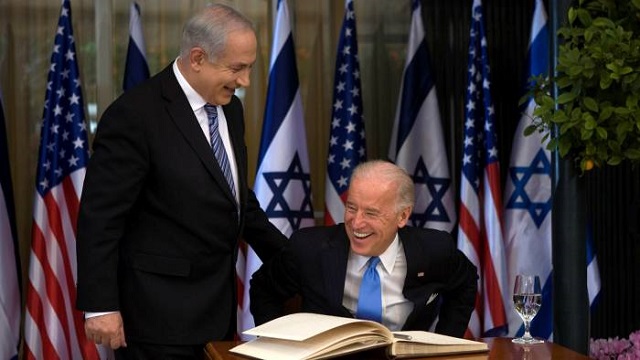Biden’s bomb sales to Israel are an obstacle to peace Comment
New in Ceasefire, Politics - Posted on Saturday, May 22, 2021 12:41 - 0 Comments
By Andrew Smith

US Vice President Joe Biden with Israeli prime minister Benjamin Netanyahu in Jerusalem during a 2010 visit. (Source: AFP/Getty Images)
Over the last two weeks, hundreds of Palestinians have been killed in a brutal bombing campaign that has destroyed homes and had a devastating impact on Gaza’s already vulnerable health infrastructure. Thousands of people have been displaced, but are unable to leave what is one the most densely populated spaces in the world.
In contrast, Israel has one of the most powerful militaries in the world. Its ‘Iron Dome’ defence system has a success rate of over 90% when it comes to intercepting rockets. The Israeli military is backed by an advanced and increasingly high-tech arms industry, and ranks among the world’s largest arms exporters.
It is also a major arms importer, with the Biden administration having approved a $735 million deal only a week prior to the ongoing bombardment.
Where Israel gets it arms
Even prior to Biden’s announcement, successive US governments have shown a consistently strong and often uncritical political and military support for Israel, with Democrats and Republicans following very similar policies. It is complicated, and perhaps not possible, to put a total value on US arms sales to Israel, but, according to the US State Department, it includes $3.3 billion worth of foreign military aid every year. Analysis by the Stockholm International Peace Research Institute (SIPRI) shows that it accounts for roughly 70% of the total value of Israeli military imports.
A number of European countries sell arms to Israel, including Germany, Italy and France, although it is also hard to get robust figures for the total value of these exports. However, SIPRI’s research shows that Italy is the world’s second largest exporter of arms to Israel. Last week, port workers in Livorno, Italy, refused to load a ship carrying weapons to Israel, after being notified of the contents of the cargo by human rights monitoring groups.
Since 2015, the UK has licensed at least £400 million worth of arms to Israel. This does not include weapons licensed under the opaque ‘open licencing’ system, which allows an unlimited number of transfers to take place. As such, the real total will be far higher. This does not include licences for components for F-35 stealth combat aircraft. Around 10-15% of every jet sold has been made or developed in the UK. At present, Israel has 27 of these aircraft.
Israeli military relations
The military relationship between Israel and the US is a close-knit and intimate one. The two governments work together on the development of weapons and joint military exercises.
The UK, too, has a close military relationship with Israel, including regular training sessions and exercises, and a recent military cooperation agreement that aims “to further deepen our military cooperation.” Research from Declassified shows that the courses in question have included ordnance design and amphibious warfare.
In 2019, Israeli forces joined UK, German and Italian counterparts for Exercise Cobra Warrior, a three-week-long series of military exercises. That same year the UK Navy was among those that took part in the largest ever naval exercises hosted by Israeli forces.
The Israeli arms industry
The Israel government is a major arms dealer in its own right, with an advanced arms industry that specialises in drone technology. Much of this technology is marketed as “battle proven”, which is a garish and grotesque euphemism for it having been used on Palestinians. Reliable figures are not published, but analysis from the UK Ministry of Defence suggests that Israel is the 7th largest arms exporter in the world.
Israel’s most controversial arms export customer is arguably Myanmar, where they have dealt with leading military figures associated with the genocide against Myanmar’s Rohingya population. Recent sales to Myanmar include naval patrol boats fitted with remote weapons stations, which continued to be delivered as the Myanmar armed forces were being accused of war crimes.
In 2016, an Israeli arms company, Elbit Systems, in conjunction with Thales UK, completed delivery of 54 Watchkeeper WK450 drones to the UK Ministry of Defence, as part of an £800 million contract. Elbit has also provided drones for UK ‘border security’ as part of the government’s campaign to harass and demonise refugees crossing the Channel.
What effect would an embargo really have?
These arms exporting governments are among Israel’s closest political friends and economic allies. The signal sent by any of them imposing an arms embargo would be a very strong one and would encourage similar actions from others.
The announcement on Thursday night of a ceasefire between Israel and Hamas is welcome news, but whatever happens in the days ahead, the longer that arms sales are allowed, the greater the likelihood that they will be used again on Palestinian communities. Even a return to ‘normality’ will only allow for an unjust, unfair, and intolerable status quo to be resumed, but with a far greater rebuilding job for Palestinians. Unless there is a major change from the international community, especially the US, the injustice against Palestinians will continue.
Every government has a role to play in trying to bring about a just solution and an end to the years of blockade, repression, and violence. By continuing to arm and support Israel, Biden and other governments aren’t just failing to build peace, they are actively working against it.


Leave a Reply